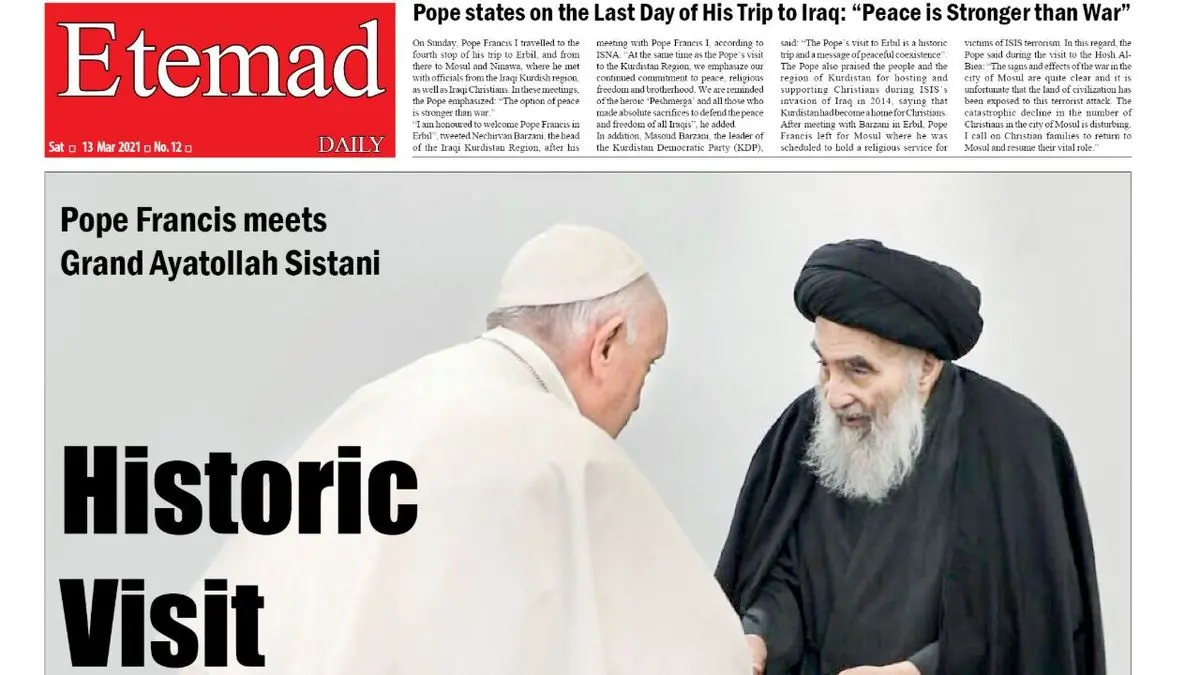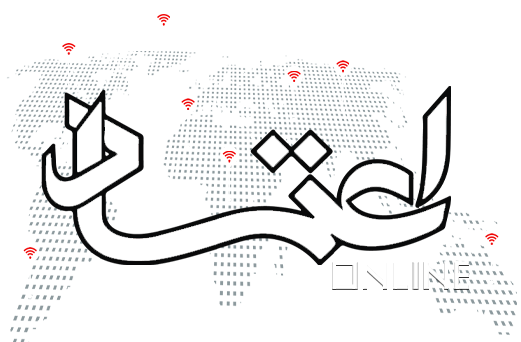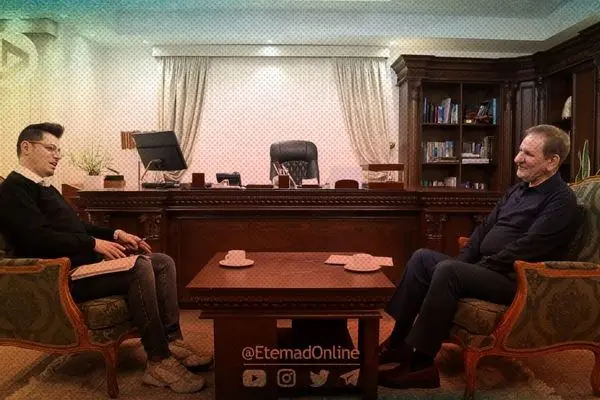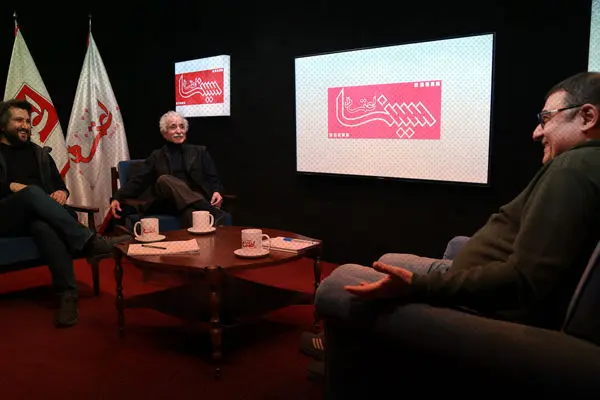صفحه انگلیسی روزنامه اعتماد در مورد دیدار تاریخی پاپ با آیتالله سیستانی+ عکس
صفحه انگلیسی روزنامه اعتماد در مورد دیدار تاریخی پاپ با آیتالله سیستانی با تیتر «دیدار تاریخی» منتشر شد.

اعتمادآنلاین|
Pope Francis meets Grand Ayatollah Sistani
Historic Visit
Pope states on the Last Day of His Trip to Iraq: "Peace is Stronger than War"
On Sunday, Pope Francis I travelled to the fourth stop of his trip to Erbil, and from there to Mosul and Ninawa, where he met with officials from the Iraqi Kurdish region, as well as Iraqi Christians. In these meetings, the Pope emphasized: "The option of peace is stronger than war."
"I am honoured to welcome Pope Francis in Erbil", tweeted Nechirvan Barzani, the head of the Iraqi Kurdistan Region, after his meeting with Pope Francis I, according to ISNA. "At the same time as the Pope's visit to the Kurdistan Region, we emphasize our continued commitment to peace, religious freedom and brotherhood. We are reminded of the heroic 'Peshmerga' and all those who made absolute sacrifices to defend the peace and freedom of all Iraqis", he added.
In addition, Masoud Barzani, the leader of the Kurdistan Democratic Party (KDP), said: "The Pope's visit to Erbil is a historic trip and a message of peaceful coexistence".
The Pope also praised the people and the region of Kurdistan for hosting and supporting Christians during ISIS's invasion of Iraq in 2014, saying that Kurdistan had become a home for Christians.
After meeting with Barzani in Erbil, Pope Francis left for Mosul where he was scheduled to hold a religious service for victims of ISIS terrorism. In this regard, the Pope said during the visit to the Hosh Al-Biea: "The signs and effects of the war in the city of Mosul are quite clear and it is unfortunate that the land of civilization has been exposed to this terrorist attack. The catastrophic decline in the number of Christians in the city of Mosul is disturbing. I call on Christian families to return to Mosul and resume their vital role."
Two Features of the Pope's Trip to Iraq
Mohammad Saleh Sedghian
The recent visit by Pope Francis to Iraq was aimed at supporting Iraqi Christians. In addition to all the suffering that the Iraqi people have suffered during the last two decades of war, occupation and terrorism, there has been great oppression over the Iraqi Christian population. In the early days of Saddam's fall, al-Qaeda's attack on the Church of Seyyedeh Nejat in Baghdad, in which al-Qaeda terrorists kidnapped worshipers and demanded the release of some of the al-Qaeda leaders in Iraq and Egypt, ended up in a bloody massacre. About 60 people, most of them Christians, were killed by al-Qaeda.
These attacks and killings continued with greater intensity during the rule of ISIS and many Christians lost their lives in terrorist attacks in Mosul, Sinjar and other parts of Iraq. Many Iraqi Christians were forced to immigrate to other countries because of ISIS and today it is estimated that the Iraqi Christian population is less than a quarter of what it was when Saddam Hussein fell to the US and Britain. The Christians themselves believe that, historically, the first inhabitants of Iraq were those who later converted to Christianity and that the Assyrians in Mosul were among the oldest tribes in Iraq.
The issue of supporting Iraqi Christians is not new. In 1999, during Saddam's rule, a great effort was made by the Vatican government to send Pope John Paul II to Iraq. However, despite Baghdad's insistence, the Pope did not travel to Iraq at that time when Saddam was under intense international pressure and internal crises. Saddam Hussein hoped to use the opportunity of the world's Catholic leader's trip to Iraq to rebuild his political image and, at the same time, find a way to reduce the international pressures and destructive sanctions imposed on Iraq at the time.
Pope Francis's visit to Iraq had two very remarkable features. The first was the display of security and stability in Iraq and the second was the Pope's unprecedented meeting with Ayatollah Seyyed Ali Sistani. As for the first feature, it can be said that this trip was a practical step to support the political process in Iraq. In particular, one should not forget that the Pope did not visit Iraq in 1999 but, 22 years later, with the changes that have taken place, there was an opportunity for the Pope to travel to Iraq. This trip intimates a level of serious support for the political developments in post-Saddam Iraq.
Two decades after the fall of Saddam Hussein, the foreign occupation, the internal crisis and the rise of ISIS, Iraq has now found a level of peace, stability and security that can host one of the world's greatest religious leaders. It is worth mentioning that one of the most vital reasons for the defeat of ISIS in Iraq was under the responsibility of Hashad al-Shaabi and the Iraqi resistance groups, a point that was not hidden from the Pope's eyes. With the welcoming delegation, he gave a special gift to Ryan Chaldean, the head of the Christian mobilization in Hashad al-Shaabi. The rosary that the Pope personally gave to Chaldean was a special gift not to be given to the other members of the welcoming committee.
Chaldean was one of the senior commanders of Hashad al-Shaabi who had very close and sincere relations with the martyrs Haj Ghasem Soleimani and Abu Mahdi Mohandes. The gift was a sign of the Christian leader's awareness of Hashad al-Shaabi's efforts to uphold the Christian right to life and fight extremist terrorism.
The second feature of the trip was Ayatollah Sistani's unprecedented meeting with Pope Francis. This was the first time that the world's Catholic leader has met with a senior Shiite cleric. In my opinion, it is very notable that the leader of the world's Catholics goes to Najaf and meets a senior Shiite authority in a simple, public environment and in a house without formalities.
This event was very important for Shiism and Shiite authorities. In addition, issues such as sanctions against ordinary citizens and the issue of Palestine were key matters during the conversations between the two senior religious leaders. I think the issues raised at this meeting between the two senior religious leaders were very important to the people of the Arab world and to Iraq. From my perspective, this is one of the most crucial interfaith meetings of the last decades, which is of special importance not only for the Shiites and the people of Iraq, but also for all the Muslims of the world.
The Golden Opportunities of an Exceptional Meeting
Ali Mousavi Khalkhali
The visit to Iraq by Pope Francis I, the head of the Catholic Church, ended on Monday with the official escort of the Iraqi president, Barham Saleh. In general, the Pope's trips have more cultural and religious aspects than political ones and, in most cases, they take on a religious and cultural flavour. However, perhaps on this occasion, the Pope's visit also had a political and diplomatic flavour due to his meeting with Grand Ayatollah Sistani, Iraq's top Shiite cleric, at Ayatollah's home in Najaf Ashraf.
The meeting of the world Catholic leader, who has international prestige for the Christian world, with the supreme authority of the Shiites was an exceptional and historical meeting as it has been an unprecedented phenomenon throughout the history of the Shiites. It can also be understood that this meeting has, for the first time, raised the position of Ayatollah Sistani, the supreme authority of the Shiites, to an international level.
Another undeniable point that can be deduced from this meeting is the time and location of the meeting. Prior to this, relations between the Islamic world and the Vatican generally took place through the Al-Azhar, as a Sunni channel. With the Shiites representing a minority in the Islamic world, they have never had such a direct relationship with the Vatican and the supreme representative of the Christian world, which are the majority of the world's religious followers.
The Vatican leader comes to see the supreme authority of the Shiite world but it seems that the Sunni world does not have its former position as the constituent majority of the Islamic world anymore. Considering that the Sunni centres of the world are in the three countries of Saudi Arabia, Egypt and Iraq (the host country of the Pope), it is obvious that the centrality of the Sunni position is at its weakest historical level, at least in the last century.
In Saudi Arabia, the widespread crackdown on Saudi clerics by the Crown Prince, Mohammed bin Salman-about 350 Wahhabi and Sunni clerics-has left the country's religious clerics in their worst position, at least in the last half-century. In Egypt, after the widespread repression of the Muslim Brotherhood as an ideological-religious movement, the security situation that ruled the country led to severe marginalization of the Muslim Brotherhood and Al-Azhar and their leaders.
The scale of this repression and the widespread propaganda against the Muslim Brotherhood and their ideologies has led to the weakening of the leaders of this movement even outside Egypt, including in Turkey, the United Arab Emirates, Malaysia, Indonesia and Qatar.
Additionally, the emergence of ISIS in Iraq and Syria with the atrocities it showed and the horror and hatred it displayed caused the extremist religious current which followed ISIS to be marginalized throughout the Islamic world. This was particularly because during these years the process that arose in the struggle against ISIS and its thought took place, not from the Sunni currents but from the Shiites and with the firm and clear support of the Shiite authority.
As such, the complete defeat of ISIS in the Arab and Islamic lands increasingly strengthened the position of the Shiites. This was particularly so during the rule of ISIS in the Islamic lands and the support of some Sunni currents, which was based on a series of tactical miscalculations leading to a severe defeat for both those ISIS and Sunni currents. As a whole, the situation of the Sunnis has been remarkably weakened and has now reached a point for which no authority can be imagined for it in the Islamic world.
In such a context, the meeting of Pope Francis I with Grand Ayatollah Sistani in Najaf reveals the fact that the Christian world has recognized the position of the Shiite authority as the representative of the Islamic world. As seen in the global media, this meeting was described as a meeting of leaders and high representatives of the two religions, Christianity and Islam. The Christian Church has always attempted to show that it seeks moderation, tolerance and the promotion and expansion of dialogue between religions and religious currents.
That is why Pope Francis's visit to Iraq and his meeting with the supreme authority of the Shiite world should be considered auspicious. It should be considered as an exceptional, golden opportunity that can change many equations and balances and be remarkably fruitful.









دیدگاه تان را بنویسید